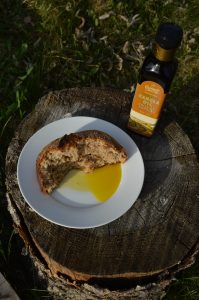 Take a midsummer drive away from Edmonton in any direction and soon you will find fields of yellow flowers in radiant bloom. This is canola, and the oil pressed from its seeds is as common in Albertan pantries as the plants are to Albertan landscapes.
Take a midsummer drive away from Edmonton in any direction and soon you will find fields of yellow flowers in radiant bloom. This is canola, and the oil pressed from its seeds is as common in Albertan pantries as the plants are to Albertan landscapes.
Canola is a Canadian invention. In fact, its name is an amalgam of the words “Canada oil low acid”. Canola is a type of rapeseed that has been bred to have a low erucic acid content.
What’s rapeseed, you ask? It’s a plant with an unfortunate name, ultimately derived from the Latin word for turnip, rapum, to which it is a close relative.
Allow me to expedite this explanation by quoting from the Canadian Encyclopedia:
Rapeseed has been an important source of edible vegetable oil in Asia for almost 4000 years. It was first grown in Canada during WWII as a source of high-quality lubricant for marine engines. After the war, Canadian plant-breeding programs, combined with changes in processing techniques, led to a reduction of erucic acid (very high consumption of which has been associated with heart lesions in laboratory animals) and glucosinolates (which cause enlarged thyroids and poor feed conversion in livestock). As a consequence, canola has become established as a major Canadian and European source of cooking oil… [1]
So, frankly, canola is not exactly an ancient tradition here in Canada. That being said I think it’s important to note that it was developed by applying traditional plant-breeding methods to rape (Brassica napus) and turnip rapeseed (B. campestris). Canola is not by definition a GMO, although there is now a huge amount of GMO canola being grown all over North America.
Since its recent invention canola has become the most common household cooking oil in our part of the world. Unfortunately I don’t have a source to confirm that statement, but working in kitchens I’m pretty confident it’s true. Most of us have a jug of canola oil sitting by the stove at home that we use as a cheap cooking oil. This style of canola oil is made by heating and pressing canola seeds. Heating increases the extraction rate, but destroys all of the volatile aromatic compounds, making a very neutral, I daresay flavourless, oil with a high smoke point. This style of canola oil is good for pan- and deep-frying.
There is, however, also cold-pressed canola oil, which is an entirely different product with low yields but big flavour. If you haven’t tasted this you’re missing out. Depending on the producer, it can be anywhere from brilliant bronze to hazy green in colour. Whatever the appearance, it has an aroma uncannily reminiscent of fresh cut lawn. Seriously: it tastes like grass and raw grain.
Because of its distinctive flavour, cold-pressed canola is very much a finishing oil. It makes a great garnish on vegetables (sautéed asparagus, for instance), soups, and salads. I also use it to make vinaigrette, but I usually blend it with a more neutral (and cheaper) canola oil.
Over the past ten years or so there have been a handful of cold-pressed canola oil producers in the province. Sadly some have folded (I think). I can’t seem to find Mighty Trio or Vibrant at any shops any more. Highwood Crossing, a grain farm near High River Alberta, is still making oil, but it seems to have a much smaller distribution than it did a few years ago. I used to buy it in retail bottles at Planet Organic, but I haven’t seen it there in a while. At Elm we buy 20 L pails direct from Highwood Crossing, and also bring in their retail bottles to sell at Little Brick. If anyone out there knows of other Albertan producers and where their oil is available, I’d be grateful to know.
Despite its rather industrial origin, gastronomically cold-pressed canola is Canada’s answer to extra virgin olive oil. It’s a really, really remarkable product and I’m thrilled to have it in my kitchen.
References
- Marsh, James H. The Canadian Encyclopedia, Second Edition. Vol I. ©1988 Hurtig Publishers Ltd. Edmonton, Alberta. Page 365.